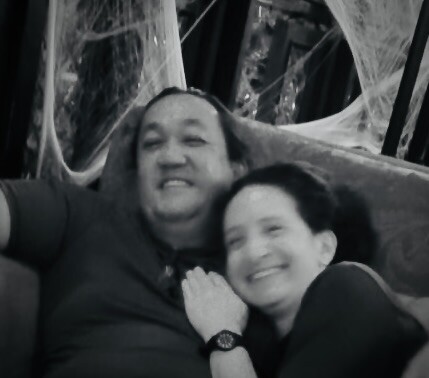Emmanuel and me. This is our last photo together.
In the wake of Emmanuel’s sudden passing, a trip to Arizona to be with his sister Marissa took on a new meaning for me. Emmanuel was more than a friend; he was a brother to me for decades, and his loss left a profound gap. His family had become mine over the years, and it was in this context of shared grief that Marissa introduced me to ‘Middle Ground,’ a YouTube series known for its attempts to bridge ideological divides. This was particularly meaningful because Emmanuel and I often found ourselves on opposite sides of many debates—he leaning conservative, and I, more progressive. Marissa, understanding the significance of these discussions and as someone from the queer community, believed ‘Middle Ground’ could serve as a platform for continuing such dialogues.
Watching Blaire White on ‘Middle Ground’ struck a chord with me, echoing the dynamic debates Emmanuel and I engaged in. Blaire’s approach—confident and nuanced in addressing complex issues—mirrored our own conversations. Prompted by Marissa, exploring a range of perspectives became not just a way to reflect on Emmanuel’s views and our debates but also a method to honor his memory.
My journey of exploration didn’t stop with Blaire; it led me to Natalie Wynn, known for her channel ContraPoints. Natalie, like Blaire, is a transgender woman who brings a unique voice to the forefront of discussions on gender, politics, and philosophy. However, unlike Blaire’s conservative perspectives, Natalie offers a more progressive viewpoint, engaging her audience with deep dives into social justice, transgender rights, and a plethora of nuanced topics.
Driven by curiosity, I delved into the content produced by both of these influential figures, finding them not only intelligent and engaging but also unapologetically forthright, each willing to express their views even when they diverge sharply from broader consensus within and outside the transgender community.
My perspectives do not entirely align with Blaire’s or Natalie’s; nor do they fit neatly within any singular, overarching narrative. This diversity of viewpoints, I’ve come to understand, is reflective of the reality that each of our viewpoints is shaped by unique journeys and experiences. This exploration of diverse voices has taught me the invaluable lesson of valuing every contribution to the dialogue around gender, identity, and society. Each voice, regardless of its volume or content, plays a critical role in advancing our collective understanding and empathy.
In reflecting on the passionate articulations of Blaire White on transgender women in women’s sports and Natalie Wynn’s nuanced explorations of gender and social justice, I am reminded of the importance of their roles as bridges in our ongoing conversation about gender and identity. Both have the unique ability to connect with different audiences, fostering a more inclusive conversation. This diversity of thought within the transgender community underscores that these communities are not monolithic. They are composed of individuals with varied experiences, beliefs, and perspectives, all of which deserve recognition and respect.
As I write this piece, I am acutely aware of the potential perception that I might be catering to one perspective over another. However, it’s important to clarify that my approach to this article, and to the subjects it tackles, has been one of careful consideration. I have strived to explore how individuals, whose views do not always align with my own, can still teach us valuable lessons and hold valid positions. While recognizing that these same voices can sometimes cause harm, I firmly believe that the world is not simply black and white. Choosing to see the value in diverse viewpoints is a conscious decision to foster greater understanding, empathy, and love among us.
Engaging with the voices of Blaire White and Natalie Wynn, especially when they present views divergent from the more commonly heard perspectives within queer and trans communities, is crucial. It promotes a deeper understanding and empathy across ideological divides, encouraging critical reflection on one’s assumptions and biases. Moreover, it highlights the importance of mental health awareness within the queer and trans communities.
As we continue to navigate these complex discussions, let us carry forward the spirit of those conversations that Emmanuel and I held dear. Engaging with all voices within communities—with openness, respect, and an acute awareness of the mental health implications—honors his memory. By recognizing the value in every perspective, even those that challenge us, we take meaningful steps toward building a more inclusive, understanding, and supportive society. This commitment not only pays tribute to Emmanuel’s impact on my life but also to the collective journey towards greater empathy and unity for all.


